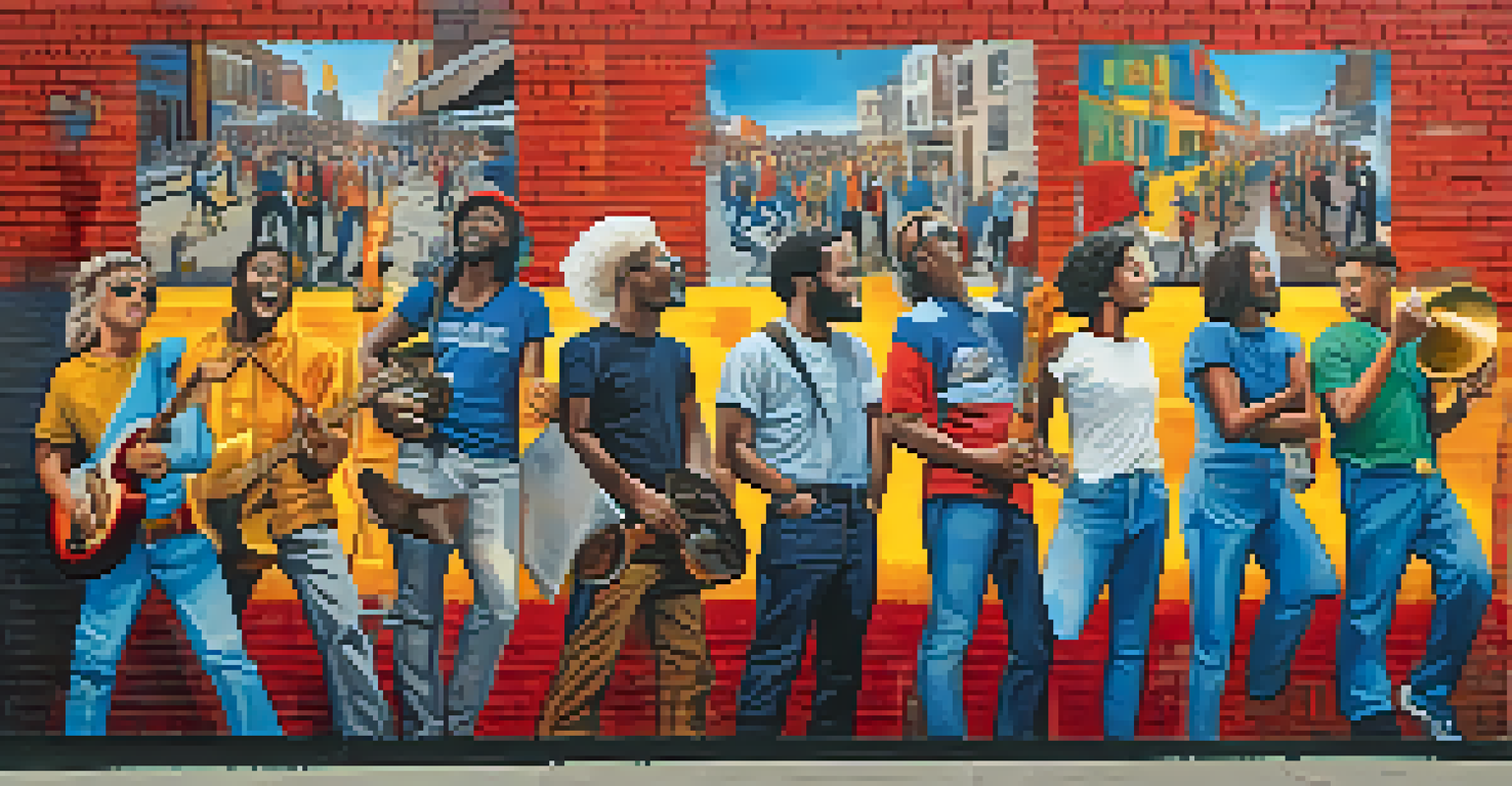Examining the Role of Music in Social Movements Across Cultures

Music as a Catalyst for Change in Social Movements
Throughout history, music has served as a powerful catalyst for social change. From protest songs to anthems of hope, melodies have often echoed the struggles of marginalized communities. For instance, during the Civil Rights Movement in the United States, songs like 'We Shall Overcome' united activists in their fight for equality and justice.
Music can change the world because it can change people.
Music not only provides a soundtrack for movements but also crystallizes the emotions and ideals that drive them. The lyrics often encapsulate the collective frustrations and aspirations of a group, making them relatable and memorable. This connection can mobilize people, encouraging them to join the cause and amplify their voices.
Moreover, the rhythm and beat of music can instill a sense of urgency and momentum, reinforcing the importance of the movement. Whether it's through marches, rallies, or social media, music resonates across generations, ensuring that the message remains alive and impactful.
Cultural Identity and Music in Social Movements
Music is often intertwined with cultural identity, making it an essential element in social movements. When communities face oppression, their traditional songs and rhythms become a form of resistance and expression of heritage. For example, the Zapatista movement in Mexico used traditional folk music to assert their cultural heritage and connect with their roots.

Through these musical expressions, groups can reclaim their identity and assert their place in society. This is particularly significant in post-colonial contexts, where indigenous music serves as a reminder of resilience and pride. By celebrating their cultural narratives, these movements challenge dominant narratives and promote social justice.
Music Unites for Social Change
Throughout history, music has served as a powerful tool to unite activists and express the struggles of marginalized communities.
In this way, music not only preserves cultural heritage but also fosters solidarity among those fighting for a common cause. The shared experience of singing or listening to these songs creates a sense of belonging, reinforcing the collective identity crucial for any social movement.
Folk Music and Its Role in Grassroots Movements
Folk music has a rich tradition of supporting grassroots movements, often emerging from the very communities facing social injustices. These songs tell stories of struggle and resilience, often passed down through generations. For instance, the labor movements of the early 20th century in the U.S. found their voice in folk songs that articulated the hardships of workers and their fight for rights.
The power of music connects people, and it can bring about social change.
The simplicity and accessibility of folk music allow it to resonate with a broad audience, making it an effective tool for mobilization. As people gather to sing and share these songs, they cultivate a sense of community and shared purpose, essential for grassroots activism. The participatory nature of folk music invites everyone to join in, transforming passive listeners into active participants.
Moreover, folk music often addresses local issues, making it deeply relevant to the communities it represents. This connection to place and experience helps to empower individuals, encouraging them to take action and advocate for change within their own contexts.
Pop Music's Influence on Contemporary Social Movements
In recent years, pop music has gained significant traction as a voice for social movements, especially among younger generations. Artists like Beyoncé and Kendrick Lamar have used their platforms to address issues such as racial injustice and gender equality. Their songs often blend catchy melodies with powerful messages, making them both enjoyable and thought-provoking.
The reach of pop music through social media and streaming platforms allows these messages to spread rapidly, creating a global conversation around social issues. For example, the #BlackLivesMatter movement has seen support from numerous pop artists who use their music to highlight systemic racism and advocate for change. This blend of entertainment and activism can inspire listeners to engage with the movement.
Cultural Identity Through Music
Music plays a crucial role in asserting cultural identity and heritage, especially in movements opposing oppression.
Additionally, pop music often capitalizes on trending topics, helping to keep social issues in the public eye. As these artists engage their audiences with both their music and activism, they foster a sense of responsibility among fans, encouraging them to become advocates for social justice in their own lives.
Global Perspectives: Music in International Social Movements
Music's role in social movements is not confined to one culture or region; it spans the globe, reflecting universal struggles for justice and equality. For instance, in South Africa during the anti-apartheid movement, songs like 'Nkosi Sikelel' iAfrika' became anthems of resistance. These songs united diverse groups under a common cause, showcasing the power of music to transcend cultural boundaries.
Similarly, in Latin America, music genres like cumbia and reggaeton have been instrumental in articulating social and political grievances. Artists often weave messages of resistance into their lyrics, drawing attention to issues like corruption and inequality. This cultural expression not only resonates with local audiences but also attracts international support for their movements.
By examining global perspectives, we see that music serves as both a mirror and a megaphone for social movements. It reflects the diversity of experiences while amplifying the voices of those who often go unheard, fostering solidarity across borders.
The Power of Protest Songs Through the Decades
Protest songs have a unique ability to capture the essence of social movements over time. From the folk tunes of the 1960s that fueled the anti-war movement to the hip-hop anthems of today addressing systemic inequality, these songs document the evolving landscape of activism. They serve as historical artifacts, preserving the spirit of resistance for future generations.
These songs often encapsulate the emotions of their time, providing a soundtrack to collective action. For example, 'Imagine' by John Lennon has become synonymous with peace movements, inspiring countless individuals to envision a world free of conflict. The timelessness of such songs demonstrates their enduring relevance in ongoing struggles for justice.
Pop Music Amplifies Activism
Contemporary pop artists leverage their platforms to address social issues and inspire younger generations to engage in activism.
Moreover, protest songs often spark conversations and inspire creativity within movements. They encourage artists and activists alike to explore new forms of expression, fostering a vibrant culture of resistance that continues to evolve with each generation.
Challenges and Critiques of Music in Activism
While music plays a vital role in social movements, it also faces challenges and critiques. One significant concern is the commercialization of protest music, where corporate interests may dilute the original message for profit. This trend can lead to a disconnect between artists and the movements they aim to support, undermining the authenticity of their messages.
Additionally, not all music resonates with every audience, and some may argue that certain genres can overshadow the voices of marginalized groups. For example, mainstream artists may inadvertently dominate the narrative, sidelining grassroots musicians who have been integral to the movement from the start. This raises questions about representation and inclusivity within the broader context of activism.

Despite these challenges, the interplay between music and social movements remains dynamic and vital. By acknowledging these critiques, artists and activists can work together to ensure that the music supporting social change remains authentic, inclusive, and true to its roots.